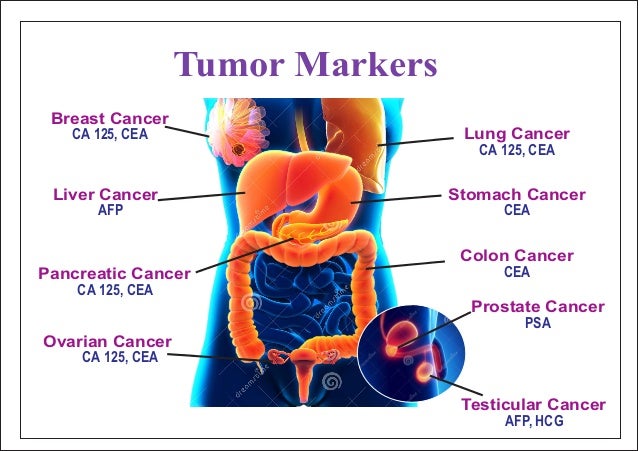People with some types of cancers have higher than normal levels of this substance. It measures a protein called CEA in the blood.
From Wikipedia the free encyclopedia A tumor marker is a biomarker found in blood urine or body tissues that can be elevated by the presence of one or more types of cancer.
What is cea tumor marker. Sensitivity and specificity are low however so it is of more use for monitoring than for screening or diagnosis. These markers are often elevated with the existence andor recurrence of cancer. Carcinoembryonic antigen CEA is a tumor marker in the blood or other bodily fluids that can be used to monitor certain cancers such as colorectal cancer.
For this reason elevated levels of tumor marker can be a sign of cancer. CEA Carcino Embryonic Antigen is a tumor marker. A carcinoembryonic antigen CEA test is a blood test used to help diagnose and manage certain types of cancers.
In response to the antigens the body produces antibodies to help fight them. Normal cells produce tumor markers in much lower levels as cancer cells. 25 ngml in an adult non-smoker and 50 ngml in a smoker.
Carcinoembryonic antigens are substances usually proteins that are produced by some types of cancer. CEA is a so-called tumor marker. The CEA test is mainly used for cancer of the colon and rectum.
CEA is tested in blood. This means that elevated levels of CEA in the blood are measured in certain cancers - especially in colorectal cancer and rectal cancer. However the serum levels are raised in some types of cancer which means that it can be used as a tumor marker in clinical tests.
A carcinoembryonic antigen CEA test is used to check how well treatment is working in certain types of cancer particularly colon cancer. An antigen is a toxin or harmful substance which causes an immune response in your body. Sensitivity and Specificity in Colorectal Cancer.
Carcinoembryonic antigen describes a set of highly related glycoproteins involved in cell adhesion. CEA is detectable in the serum through a radiommunoassay technique first developed by Thomson et al in 1969. Carcinoembryonic antigen CEA is a glycoprotein which is present in normal mucosal cells but increased amounts are associated with adenocarcinoma especially colorectal cancer.
The CEA normal levels are different for smokers and nonsmokers. Tumor makers are molecules that can be detected in circulating blood. Read on to learn about the meaning of different CEA blood ranges the CEA test and how to know what a healthy blood test range is for CEA.
Carcinoembryonic antigen CEA and the carbohydrate antigen 19-9 CA 19-9 are two markers whose levels may be tested to determine the presence of colorectal cancer. An elevated or rising CEA level indicates cancer progression or recurrence. A tumor marker is anything present in or produced by cancer cells or other cells of the body in response to cancer or certain benign noncancerous conditions that provides information about a cancer such as how aggressive it is whether it can be treated with a targeted therapy or whether it is responding to treatment.
Serum levels can also be elevated in heavy smokers. Carcinoembryonic antigen CEA is a protein found in many types of cells but associated with tumors and the developing fetus. CEA therefore has a role as a tumour marker.
CEA is normally produced in gastrointestinal tissue during fetal development but the production stops before birth. Consequently CEA is usually present at very low levels in the blood of healthy adults. Tumor markers are substances produced by cell- either normal or cancer cells.
For pseudomyxoma peritonei PMP and appendix cancers the tumour markers which most specialists will look at are CEA carcinoembryonic antigen CA-125 cancer antigen 125 and CA 19-9 cancer antigen 19-9. One way they can do that is with a carcinoembryonic antigen test. When levels are decreasing it may indicate that cancer is responding to treatment and when increasing may suggest a recurrence progression or spread metastasis of the disease.
Your doctor may use the test results to determine whether the treatment against cancer is working. CEA is a protein marker indicative of several types of cancers especially colon cancer. The CEA test is used especially for cancers of the large intestine and rectum.
The normal range is. A tumor marker is anything present in or produced by cancer cells or other cells of the body in response to cancer or certain benign noncancerous conditions that provides information about a cancer such as how aggressive it is whether it can be treated with a targeted therapy or whether it is responding to treatment. I It is present at very low serum concentrations in healthy adults and at high concentrations in a variety of cancers particularly epithelial tumors.
There are many different tumor markers each indicative of a particular disease process and they are used in oncology to help detect the presence of cancer. Antigens are substances made from cancerous tumor cells. For adult smokers the levels are slightly higher and normal levels range from 0 to 50 mcgl.
Read here what CEA is exactly how the doctor determines it and which diseases cause elevated levels. However other diseases can increase the reading. Usually for adult nonsmokers the normal CEA levels range from 0 to 25 mcgl.
Carcinoembryonic antigen CEA is used as a tumor marker. The Carcinoembryonic antigen CEA test is a blood test used to diagnose and manage certain types of cancer.
